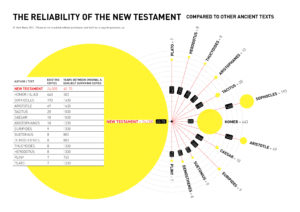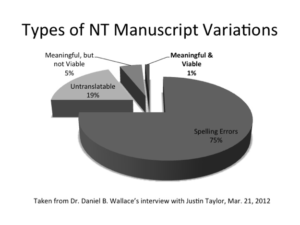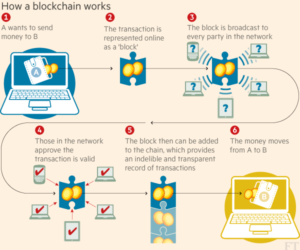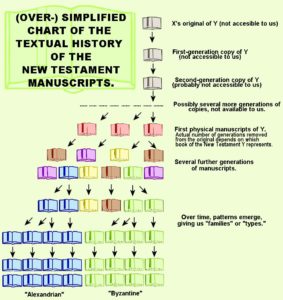Biblical Reliability and Validation relies on
Thousands of independent manuscripts
Through the ages, but especially in modern times, people have scoffed at the idea that the Bible is reliable because there are so many various manuscripts, parts or wholes, that are not exactly alike. Their common retort is, “How can the Bible be God’s word when there is no single definitive written source?” Their argument appears plausible until one begins to understand the problem of a single source document. In fact, secure financial transactions are beginning to use this same approach to safeguard their data, your financial records!
No one disputes the inerrancy of the original manuscripts. Many bemoan that since the original manuscripts are gone no one can know accurately if our modern Bible is even close to the original documents. The above graphic shows that our current manuscripts are many times removed from the original documents. From a simplified perspective this appears to be a weakness; however, it is actually the strength of keeping God’s words accurate to the original autographs.

Notice how few documents are available of these
Ancient texts which are considered valid copies
A quick glance at the table in the above graphic shows how few copies have been found of several ancient manuscripts which are considered historically important. The yellow circles indicate relative numbers of available ancient copies of said manuscripts. Notice the number of New Testament manuscripts, both parts or whole available to the scholar; thousands! People say that these documents frequently disagree with each other making them unreliable! This appears to be a valid objection until painstaking analysis reveals something quite different.

Of all the documented textual differences
Only One Percent May be of Significance
The above graphic shows that the vast majority of errors are nothing more than spelling differences, not uncommon in the days before dictionaries and agreed upon spellings. Most of the other differences concern conjunctions and other relatively minor words. Of the one percent that may be of theological significance one is guided by the maxim that “scripture defines scripture”. One does not build a doctrine on one verse or a small number of verses. Doctrines are built upon what the Bible reveals throughout its writings so even the one percent significant variations would need support from other portions of scripture to make a significant differences in doctrinal understanding.
Additionally, having many diverse, scattered copies is one of the strengths of textual reliability, not a weakness. Many do consider this a weakness and point to their single source writings; such as the Muslims. Consider the problem if the Bible was a single source document. Who would be entrusted to keep it safe through the ages? Who would be allowed access to the document? Who would be allowed to validate any copies made from the single source document? In fact, sinful man has constantly sought to hedge in and distort God’s words. This was the attack by Lucifer with Woman in the Garden when he got her to doubt her own understanding. He was then able to substitute his own goals as her own leading her to reject God’s words. Think how easy this could be accomplished down through the years if there was only a single source for the Bible. The dominate medieval church rivals, Roman Catholic and Greek Orthodox, would gladly have changed passages to suit their own ends. The churches hostility against the Jews would have quickly found renewed validation in a redacted Bible.
Yet, think how hard the task of redacting God’s words when there are literally thousands of copies of manuscripts scattered “who knows where”? It would be a monumental task to track down every last manuscript, make the necessary changes using the ink and supplies of the original period and not get caught! Actually, the word impossible comes to mind. This is why God did not preserve a single source document because the temptation would be too great to resist; men would certainly change the Bible and constantly reducing it to a corruption of men’s words.
In our modern era there is another type of documentation that has suffered from being a single source. Financial institutions {Master Charge}, for one example, have kept their depositors data in a centralized database, single source. Hackers have been able to breech these centralized databases, acquire valuable depositor data, sale it or enrich themselves via identity theft. However, there is now a new technology coming on line that will decentralize data transactions making the hackers job much harder.

The Blockchain relies on many copies of records
To insure the accuracy of all the records
Blockchain in its simplest form is simply the decentralization of one’s database among many computers. Each transaction would be stored on many computers and when a request was received asking for validation of that transaction the many copies would have to agree. If they did not agree the transaction would be considered inaccurate and no transfer of funds would occur. This makes it visually impossible for hackers to falsify data because they would not know where all the copies would be kept and thus could not falsify all the records necessary in order to spoof the system and transfer funds to one’s self. In other words, the very system God has used for millennium to preserve His word is now the process man will use to protect his data.
The irony is that sinful man who rejected God’s method as silly and impractical now finds it immensely practical and valuable. Herein is the issue: man cannot criticize the technique if he uses it himself. The system is either valid or it is not valid. It cannot be valid for man but invalid for God as this violates the Law of Non-Contradiction {the technique cannot be both valid and invalid}. Once again, God is vindicated by the very people who rejected Him. I hope you find this amusing and informative.

